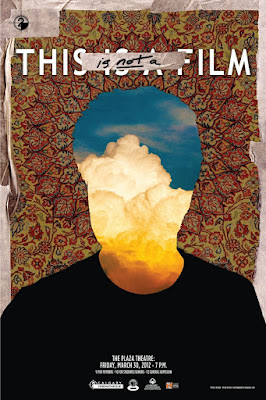Jafar Panahi, the Iranian director, is a guy who can't stop making films. He's been finding ways to create them while under house arrest in Iran after his last film was not approved since around 2010. And so he finds a way to make it happen, to reflect on film and what it means to him. This Is Not A Film (2011) follows him through a day in his home discussing his appeal case and hanging out with another filmmaker, reflecting on the situation he's in. It was filmed entirely in his home and, the legend has it, smuggled out in a cake before eventually being submitted to the Cannes Film Festival.
I'll be honest, I haven't seen any of his pre-ban films, though I have them on my criterion channel watchlist. The story behind his recent films is just so compelling that they are what drew me in. Taxi (2015) was the first I saw and it follows him driving a taxi around Tehran in a period when he's allowed out of his house but still banned from officially making movies or leaving a country. This is what man trying to be honest can do from within his own home. I think this one actually makes a great double feature with Jim Jarmusch's Paterson, as they both are very meditative reflections of art through the story of one man's simple day-to-day experience.
There's something so beautiful that slowly builds here, as we observe Panahi and how he speaks about life through the language of film. Early on he decides to try and describe last film he couldn't make as he would've made it. After painting the opening scene he stops, coming to the realization that "You have to make the film first, to be able to describe it." The film is not the plan of the film but the end result of the alchemy, struggle. and spontaneity that comes out of the process. He turns to scenes from previous films he's made to describe examples, and we watch these, though only as captured by the camera filming his TV screen, and they becomes reveries or like dream sequences within this film.
Visually, at first you just notice the lack of any real cinematography. He has a handheld camera and an iphone. After we as the audience become accustomed to this as a baseline, we realize he is able to capture some beautifully spontaneous angles and moments. These may not be objectively cinematic, but they become so through the context, both of what we are given in the film and through the situation Panahi is in and what we can sense of his feelings.
It makes strong and subversive statements, while balancing both acceptance and frustration at the same time. He doesn't comment directly on the government at any point - that would be bound to get him in more trouble - but he lets it speak for itself. It is New Year's night and the city is alive with light and sound for Fireworks Wednesday, a cultural tradition we learn is condemned by leadership as unreligious from the newscasts we pick up on the TV. Panahi surfs the internet to find some basic information and every page is either highly censored or completely blocked. Daily life of comings and goings is relatable as it is for most humans -- he feeds his pet, he makes tea, friends and neighbors come and ask for this or that -- but there are these cracks that help to outline the greater freedoms that exist in many other places throughout the world.
